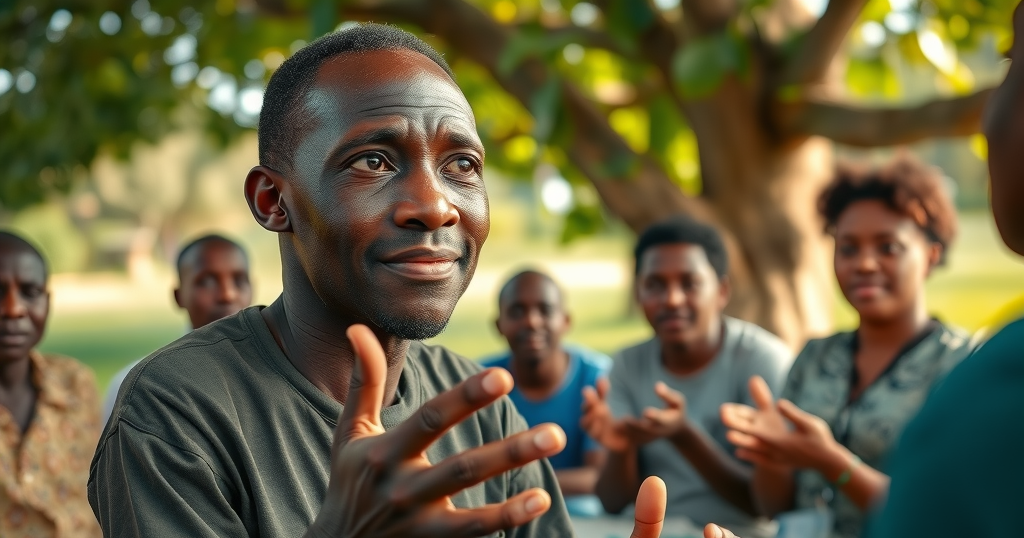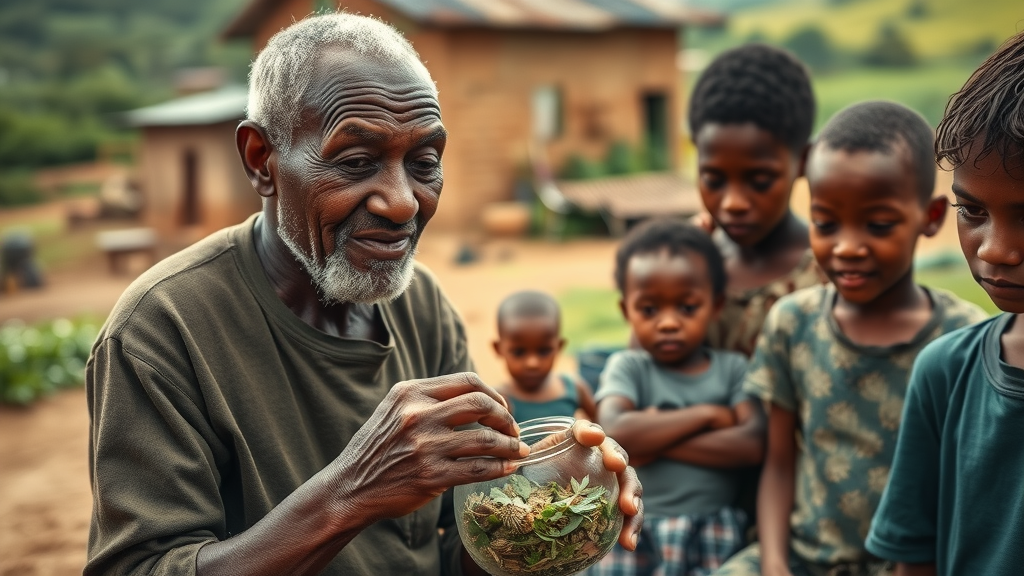“Did you know that over one in four Ugandan adults now live with a chronic illness such as diabetes or hypertension? Yet many are thriving, not just surviving, thanks to supportive families and programs like Case Clinic's chronic care.”
Living with chronic illness in Uganda can feel overwhelming, but you are not alone. Amid rising rates of diabetes and hypertension, countless Ugandans are discovering new ways to thrive using daily management strategies, community support, and innovative health programs like those at Case Clinic. This guide shares practical, culturally-sensitive advice to help you live well, find hope, and empower your journey with chronic disease.
What You’ll Learn in This Ugandan Guide to Chronic Illness Management
Realistic strategies to manage diabetes and hypertension daily
Navigating healthcare and medication adherence challenges
Leveraging local resources for chronic condition management
Role of family and community among patients
Quality of life: Hope, purpose, and thriving

Living Beyond Diagnosis: Thriving with Diabetes and Hypertension in Uganda
A diagnosis of diabetes or hypertension can be daunting—especially in Uganda, where rising numbers reflect a pressing public health challenge. Yet, amid these statistics, heartening personal stories shine through. Many among patients have embraced a new lease on life, seeing their diagnosis not as an ending, but as the beginning of empowerment. For example, one Case Clinic patient recounts, “Living with diabetes doesn’t mean my ambitions stopped. I learned how to manage my health, and my family became my greatest supporters.” Such stories prove that, even when managing chronic disease, purpose, confidence, and a satisfying daily routine are well within reach.
The key to living beyond diagnosis is the blend of self-management, supportive communities, and integrated chronic care programs. Ugandans are finding strength not only in medical treatment but also in leveraging local support systems and culture. By accepting support, finding role models, and celebrating progress—however gradual—you, too, can move from simply coping to thriving.
“Living with diabetes doesn’t mean my ambitions stopped. I learned how to manage my health, and my family became my greatest supporters.” – Patient at Case Clinic

Understanding Your Chronic Condition: Diabetes and Hypertension in Uganda
Understanding your diagnosis—whether it’s diabetes, hypertension, or both—is vital for effective self-management and for advocating on your own behalf. In Uganda, hypertension and diabetes are rising alarmingly, with the World Health Organization and local studies noting that more than 26% of adults live with hypertension, and over 3% with diabetes. These figures underline an urgent need for chronic condition education, increased awareness of risk factors (such as family history, diet, and inactivity), and access to both preventative and ongoing care.
Each chronic disease presents unique challenges, but with the right knowledge, you can actively participate in your care. Data collection from the Ministry of Health, alongside input from health workers and patient advocacy groups, provides the foundation for tailored treatment plans in Uganda. By being informed about the basics—and the latest in chronic disease care—you empower yourself against complications and improve your quality of life.
Key Facts: Hypertension and Diabetes among Patients in Uganda
Chronic Disease |
Prevalence in Uganda |
Key Risks |
Primary Treatments |
|---|---|---|---|
Diabetes |
3.3% adults |
Obesity, inactivity, family history |
Medication, diet, monitoring |
Hypertension |
26.4% adults |
Salt intake, stress, genetics |
Medication, lifestyle |
Other Chronic Conditions |
7-10% |
Infection, genetics |
Depends on condition |
Qualitative Study: Experiences and Competing Interests in Chronic Disease Care
Real-life experiences shared in qualitative studies from Uganda’s chronic disease clinics highlight the complexity of care. Many among patients, especially those in Kampala and other urban centers, navigate competing interests—balancing medication costs, daily work, and the emotional weight of illness. An insightful Case Clinic specialist explains, “Chronic disease among patients in Kampala presents unique challenges, but integrated care and patient education remain our strongest tools.”
These findings reflect the layered realities of chronic disease care in Uganda—economic pressures, healthcare system barriers, and the ongoing work of patient education. Health workers play a pivotal role in building trust, while family involvement and the support offered by modern health systems, like those at Case Clinic, provide critical relief. It is this holistic, community-oriented approach that keeps hope alive and ensures lasting change.
“Chronic disease among patients in Kampala presents unique challenges, but integrated care and patient education remain our strongest tools.” – Chronic Disease Case Clinic Specialist

Daily Management Strategies: Practical Tips for Ugandans Living with Diabetes and Hypertension
Diet, Exercise, and Monitoring with Local Resources
When it comes to diabetes management Uganda and hypertension care Kampala, daily routines matter most. Begin with nutrition: embrace affordable, healthy eating by filling your table with local staples like beans, millet, matoke, and fresh vegetables. These foods help manage blood sugar and blood pressure, are widely available, and fit easily into Ugandan culinary traditions. Simple swaps—using less salt, grilling instead of frying, enjoying fruit as dessert—can make daily habits healthier and sustainable.
Culturally-accepted exercise routines, such as brisk walking, gardening, or joining dance-exercise groups, offer cardiovascular benefits without the need for expensive gym memberships. Regular physical activity helps control body weight, supports heart health, and lowers risk factors associated with hypertension and diabetes. For monitoring, seek out local pharmacies or health facilities that stock blood pressure monitors and glucose meters. Many community health workers and clinics can demonstrate proper use and even offer group health education sessions for ongoing skill building.
Affordable healthy eating using local foods (beans, millet, matoke)
Culturally-accepted exercise routines for chronic condition management
Blood pressure and sugar monitoring: Where to find supplies in Uganda
Including traditional and modern approaches in daily management

Incorporating Chronic Disease Management into Work, Family, and Social Life
Long-term management of chronic illness is most successful when integrated into all aspects of life. At work, maintain regular meal times and hydration, and discreetly manage medications as needed. Advocate for reasonable accommodations, such as flexible break times for blood sugar checks, especially as awareness about diabetes and hypertension grows in Ugandan workplaces.
Social life often involves shared meals and celebrations. While tempting foods and drinks abound, prioritize your health by making mindful choices, politely declining offerings that may impact your condition, and explaining your needs to supportive friends and family. Many families in Uganda uphold traditions that encourage healthy shared meals and physical activity—lean into these practices, and gently educate family members about the importance of chronic disease management.
Balancing work and health with diabetes and hypertension
Navigating social occasions while adhering to chronic condition care
Family traditions that support or challenge chronic disease management
Medication and Healthcare Access: Overcoming Adherence Challenges in Uganda
Adherence to Medication: Cost, Access, and Competing Interests
One of the most profound challenges in hypertension and diabetes management is maintaining adherence to medication—especially when cost, supply chain issues, and competing household needs come into play. Many Ugandans must make difficult decisions, prioritizing essential commodities over consistent healthcare spending. This is where community and innovative programs like Case Clinic’s chronic care can make all the difference. Case Clinic provides medication refill reminders, patient education, and streamlined access to essential prescriptions, reducing the burden for patients and their families.
Gaps in healthcare access remain a reality, particularly in rural areas far from major health facilities in Kampala. Despite this, a growing number of local pharmacies and health centers now carry essential medications for diabetes and hypertension. Peer support, shared trips to health centers, and tapping into savings or insurance programs are all practical strategies for improving medication adherence.
Finding affordable medications for diabetes and hypertension in Kampala
Addressing gaps in healthcare access for chronic conditions
Accessing care through programs like Case Clinic’s chronic care

Competing Interests: Balancing Daily Expenses with Long-Term Medication
For many chronic disease patients, the strain of choosing between daily necessities, like food, children’s school fees, and transport—and long-term medication is ever-present. These competing interests can lead to skipped doses or abandoned care regimens, with serious health consequences. According to a Case Clinic specialist, “Choosing between food, fees, and medicine is a difficult reality among patients. Our role is to support sustainable solutions.”
Addressing these challenges requires a systems-level approach: policy reforms for subsidized medicines, community health insurance schemes, and targeted support from health education programs. Health workers, social workers, and clinic initiatives play a crucial role in linking families to the resources and knowledge they need, so no one has to choose between essential expenses and their long-term wellbeing.
“Choosing between food, fees, and medicine is a difficult reality among patients. Our role is to support sustainable solutions.” – Case Clinic Specialist
Case Highlight: How Case Clinic Supports Chronic Disease Management in Uganda
Medication refill reminders
Patient counseling and education
Access to specialist clinics for diabetes and hypertension

Family as Your Healthcare Team: Community Support in Chronic Illness
Leveraging Family and Community Systems among Patients
For Ugandans, family and community are foundational to long-term chronic condition care. Family members often help interpret symptoms, ensure adherence to medication schedules, and accompany patients to health facilities. Open communication creates space for shared problem-solving and timely interventions when challenges arise. Community-based self-help groups are also flourishing—offering mutual encouragement, peer learning, and a safety net for emergencies.
The role of trusted friends and neighbours cannot be understated. They can provide a listening ear, assist with daily tasks, and help manage stress, all of which impact diabetes management Uganda and hypertension care Kampala outcomes. When support becomes the norm, patient confidence—and success—grows.
Roles of family and friends in medication adherence
Encouraging open dialogue about chronic conditions
Creating community self-help groups for diabetes and hypertension
“Our strength comes from supporting each other—every reminder, every meal shared, is part of healing.” – Ugandan Patient Testimonial

Cultural Attitudes and Family Expectations in Chronic Disease Care
Navigating the intersection of traditional practices and modern medicine is part of life for many Ugandan families. Some patients choose to integrate herbal remedies and spiritual healing alongside prescribed medication. Respecting elders’ roles in chronic disease case management, while ensuring open discussions and health education, builds a bridge between generations and healing philosophies.
Patient-centered care means acknowledging fears, superstitions, and family expectations—whether they spur hope or resistance. Health workers and clinic programs excel when they empower patients to draw from both traditional and modern strengths while maintaining adherence and informed decision-making.
Navigating traditional healing approaches alongside modern medicine
Respecting elders’ roles in chronic disease case management

Maintaining Hope and Quality of Life: Living Fully with Chronic Disease
Strategies for Sustaining Positivity and Purpose
Chronic disease is not the end of your ambitions. By setting meaningful goals beyond your diagnosis, whether it’s pursuing an educational milestone, enjoying time with grandchildren, or leading a support group, purpose and hope remain at the forefront. Celebrate every “small win,” like improved blood sugar readings or completing a week of regular exercise, to reinforce your sense of achievement.
Avoiding burnout means taking time for rest and spiritual renewal, seeking help for mental health when needed, and surrounding yourself with uplifting people. Programs at Case Clinic and peer support groups are invaluable sources of motivation and hope, showing that living well is not only possible, it's achievable and worth celebrating.
Setting meaningful goals beyond diagnosis
Celebrating small wins in chronic condition management
Preventing burnout and nurturing mental health

People Also Ask: Managing Chronic Disease in Uganda
What are common challenges of managing diabetes and hypertension in Uganda?
Limited access to affordable medication remains a major barrier, particularly for those in rural regions and among low-income households.
Occasional shortages of monitoring devices, like blood pressure and glucose meters, hinder regular self-care and early intervention.
Social stigma and a lack of chronic condition awareness contribute to delayed diagnosis and support-seeking.
The long-term financial cost and difficulties in traveling to specialist clinics discourage consistent healthcare engagement.
How do traditional healing practices interact with modern diabetes and hypertension care?
Many Ugandans use herbal remedies alongside prescription medicine, seeking holistic healing grounded in culture.
It’s essential for families and patients to seek health education on how to integrate both traditional and modern approaches safely.
Modern clinics and healthcare providers in Uganda often build bridges, rather than opposition, with traditional healers to support the patients’ wishes while prioritizing safety.

What is the role of community groups in supporting chronic illness patients?
Peer support networks encourage daily medication adherence by sharing reminders and encouragement.
Group members often pool savings to handle medical emergencies or cover transport to health facilities.
Collective sessions enable knowledge sharing on disease management, healthy habits, and accessing care when needed.
How can families help loved ones adhere to chronic medication?
Offering timely medication reminders and kind words can boost adherence significantly.
Helping organize regular health facility checkups ensures continuity of care and early detection of complications.
Collaborating on healthy meal planning and shared physical activity encourages a supportive lifestyle for the patient.
Key Takeaways: Empowering Ugandans Living with Diabetes and Hypertension
You can thrive despite chronic illness with the right daily management.
Community and family are foundational for long-term care.
Access to programs like Case Clinic's chronic care ensure better outcomes.
Local resources and traditional practices can complement modern care.
FAQs on Chronic Disease, Hypertension and Diabetes in Uganda
What are the best local foods for managing diabetes and hypertension?
Some of the best local foods include beans, groundnuts, millet, matoke, sweet potatoes, leafy greens, and fresh fruit in moderation. These foods provide fiber, vitamins, and minerals without rapidly raising blood sugar or blood pressure. Limit refined carbohydrates and processed salts as part of an everyday healthy diet.
How often should I visit the health facility for chronic care checkups?
For most people with diabetes or hypertension, a checkup at the health facility every 1–3 months is recommended to monitor progress, adjust medications, and receive guidance from health workers. Consistent visits help detect complications early and sustain your management plan.
Does Case Clinic offer remote support for medication management?
Yes, Case Clinic provides medication refill reminders via phone and text, tele-counseling with health professionals, and access to remote health monitoring for stable patients. These services reduce the need for frequent travel and help keep patients on track with their long-term care goals.
Is it safe to combine traditional herbal treatments with prescribed chronic medication?
Combining traditional herbal treatments and prescribed medicine should only be done after consulting with trained health professionals. Some herbal remedies can interact with medications or cause side effects. Open communication between patients, traditional healers, and medical staff is vital for safe integration.
Conclusion: Living Well with Chronic Illness in Uganda
“Chronic illness is not an end, but the start of a new chapter, empowered, supported, and hopeful.” – Case Clinic Provider
Discover Case Medcare Services Uganda: Your Partner in Chronic Disease Management
Find reliable support and grow your circle of care at https://casemedcareservices.org
Sources
World Health Organization – https://www.who.int/health-topics/noncommunicable-diseases
Global Health Observatory – https://www.ncbi.nlm.nih.gov/pmc/articles/PMC8973216/
Managing chronic illnesses like diabetes and hypertension in Uganda requires a multifaceted approach that includes daily management strategies, medication adherence, family support, and maintaining quality of life. The Uganda Diabetes Association offers comprehensive services such as health worker training, screening services, and self-care education to empower individuals in managing their conditions effectively. (ugandadiabetesassociation.org) Additionally, a study published in the Annals of Global Health highlights the importance of social support networks, emphasizing that patients often rely on family and peers for both instrumental and emotional assistance in self-care activities. (annalsofglobalhealth.org) By leveraging these resources and support systems, individuals can enhance their ability to manage chronic conditions and improve their overall well-being.
 Add Row
Add Row  Add
Add 

Write A Comment